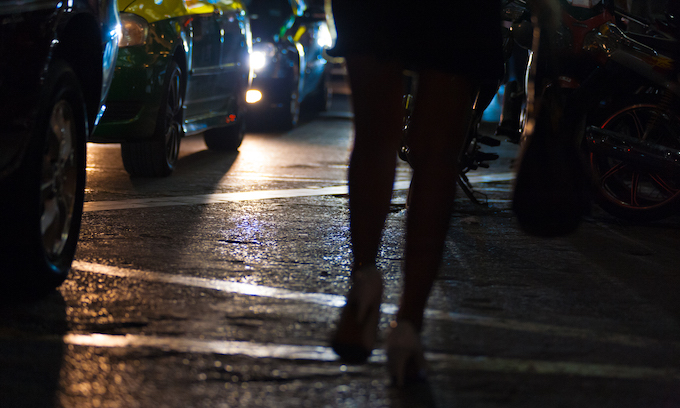California lawmakers voted Friday to decriminalize loitering for the purpose of prostitution, following passionate debate on a controversial bill that will be sent in January to Gov. Gavin Newsom for his consideration.
Senate Bill 357, authored by Sen. Scott Wiener, D-San Francisco, would prohibit law enforcement from using loitering as evidence of sex work. The measure divided not only Democrats from Republicans, but also the liberal wing of the majority party from its more moderate members.
After the measure passed on a final Senate vote, Wiener announced that instead of sending SB 357 to the governor immediately, he would wait until January.
“Holding the bill at the Senate desk is simply a temporary delay,” spokeswoman Catie Stewart said in a written statement. “It provides the senator and our coalition more time to make the case about why this civil rights bill is good policy that should be signed into law and why this discriminatory loitering crime goes against California values and needs to be repealed.”
Democrats supporting the bill said law enforcement too frequently profiles individuals — specifically Black, brown and transgender Californians — and charges them with a misdemeanor that affects their ability to find stable housing and employment.
“Arresting people because they ‘look like’ sex workers is discriminatory and wrong, and it endangers sex workers and trans people of color,” Wiener said in a statement after the bill passed an Assembly vote Friday. “Anti-LGTBQ and racist loitering laws need to go. Sex workers, LGBTQ people, and people of color deserve to be safe on our streets.”
Wiener’s office said that under the current law, police can use such things as whether a person is speaking with other pedestrians, wearing revealing clothing or moving in a certain way to determine whether a person intends to engage in sex work.
The bill is co-sponsored by ACLU California Action, which in an Assembly floor analysis of the bill cites data for arrests in Los Angeles between 2017 and 2019 as evidence of the current law’s discriminatory elements. Black adults made up more than 56% of arrests for loitering for purposes of prostitution, while women accounted for more than 67%, “a figure that is likely an underrepresentation given that the data set may count many trans women as males.”
“For too long, our communities have been harmed by tough-on-crime laws which are used to target and harass our community members, threatening our ability to exist safely in public spaces. By passing SB 357, the Legislature recognizes the decades of harm that California’s loitering law has had on tens of thousands of people, especially Black and brown women, trans women of color and sex workers, giving us a path to clear our records,” The DecrimSexWorkCA coalition wrote in a statement.
Moderate Democrats and Republicans argued the measure would harm law enforcement’s ability to crack down on human trafficking and protect victims from abuse.
“The part about it is those young girls out there,” said Assemblyman Jim Cooper, an Elk Grove Democrat and former captain in the Sacramento County Sheriff’s Department. “What do we do then, how do we deal with that?”
Assemblywoman Cottie Petrie-Norris, D-Laguna Beach, similarly said she was worried about the “unintended consequences” of SB 357.
“For me, when the unintended consequence is making it more difficult to protect victims of child trafficking, even if it’s just a possibility, that’s not something I can support,” she said.
Stephany Powell, director of law enforcement training and survivor services for the National Center on Sexual Exploitation, said she worries the bill would grant legal protections to those sexually exploiting and hurting women.
“It severely cripples law enforcement’s ability to arrest and prosecute human traffickers and sex buyers,” Powell, a former LAPD sergeant, said. “If it’s repealed, sex buyers would have immunity.”
Powell added that it’s unfair to say prostitutes from marginalized backgrounds would choose to do this work, and urged lawmakers to instead focus on helping women find education opportunities and “sustainable jobs.”
“The assumption becomes that women who are marginalized want to do sex work and it almost becomes, ‘well since that’s what you are doing, we are just going to make it legal so you can do it,'” Powell said. “If we’re going to talk about things like systemic racism, then use this energy to fix the system where sex work does not have to be their only choice.”
The Assembly passed SB 357 on a 41-26 vote, and the Senate approved the measure 26-9.
___
(c)2021 The Sacramento Bee (Sacramento, Calif.)
Visit The Sacramento Bee (Sacramento, Calif.) at www.sacbee.com
Distributed by Tribune Content Agency, LLC.
—-
This content is published through a licensing agreement with Acquire Media using its NewsEdge technology.



















Only stands to reason that if the politicians can prostitute themselves and not be tried for criminal activity then so can the other lowlife.
Why not just legalize ALL CRIME OUT There.. They are doing so by dint of NOT ENFORCING THE LAW. So just legalize everything…
THEN SINCE NOTHING IS now a crime, there is NO more need for cops, no more need for prisons, AND NO MORE NEED FOR LAW MAKERS!